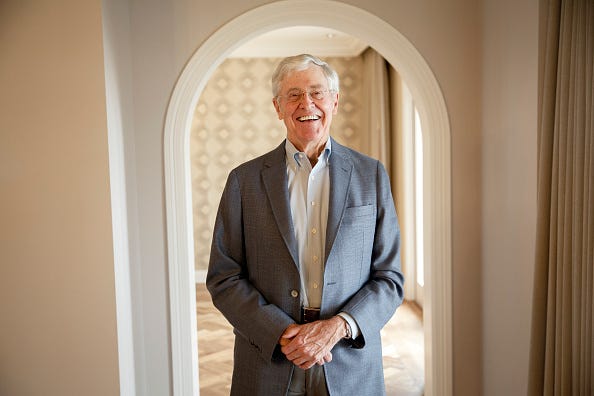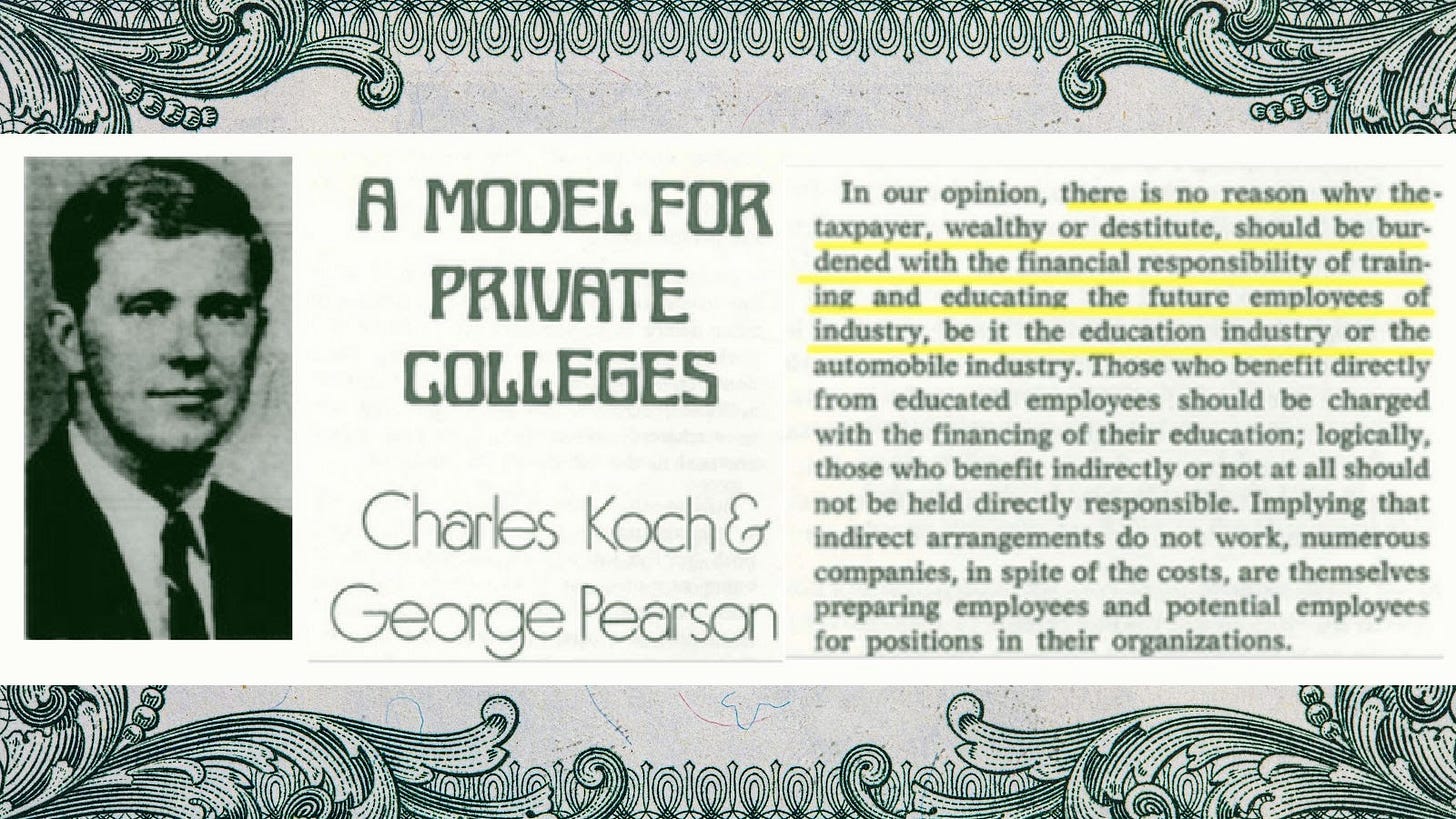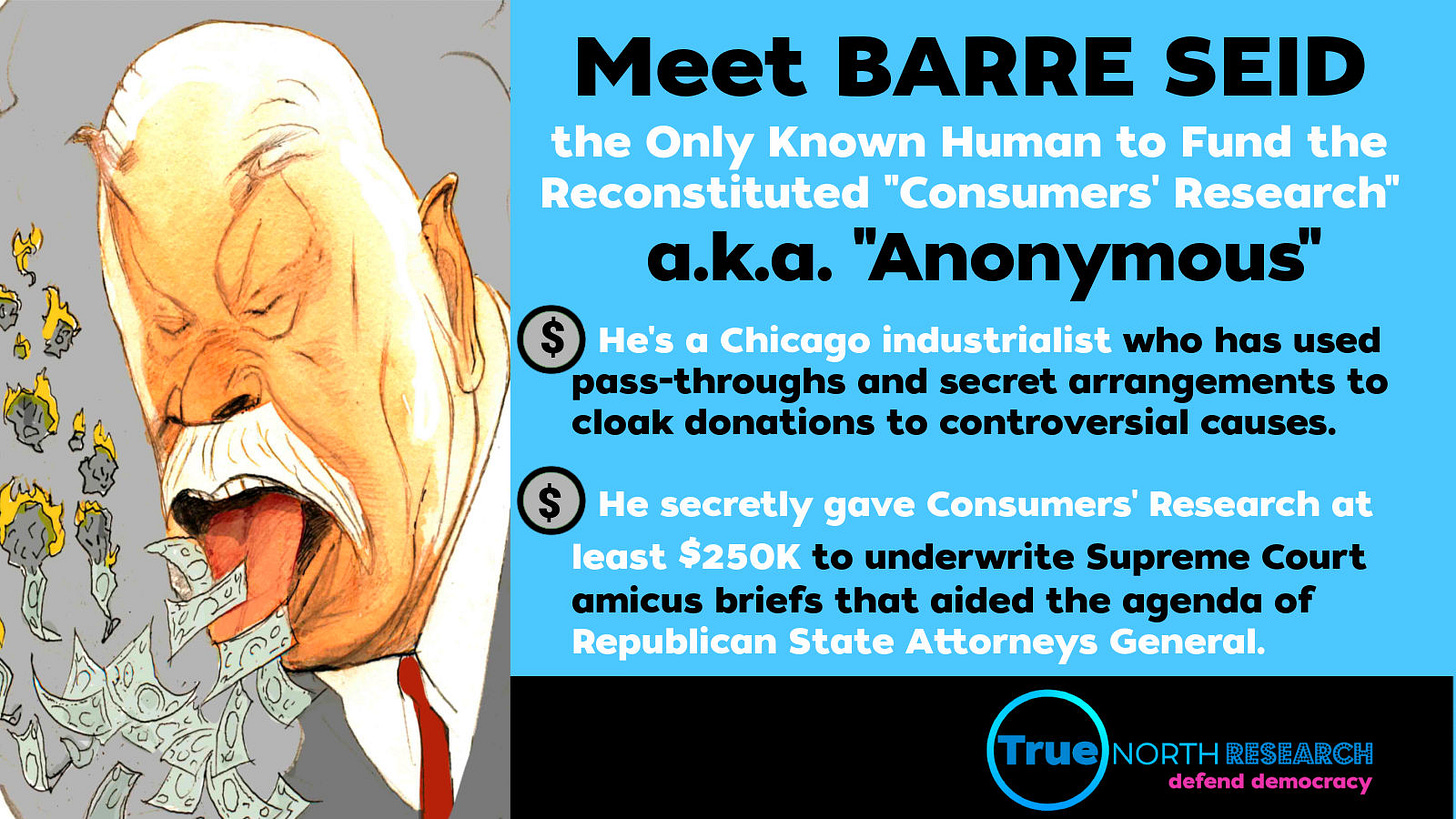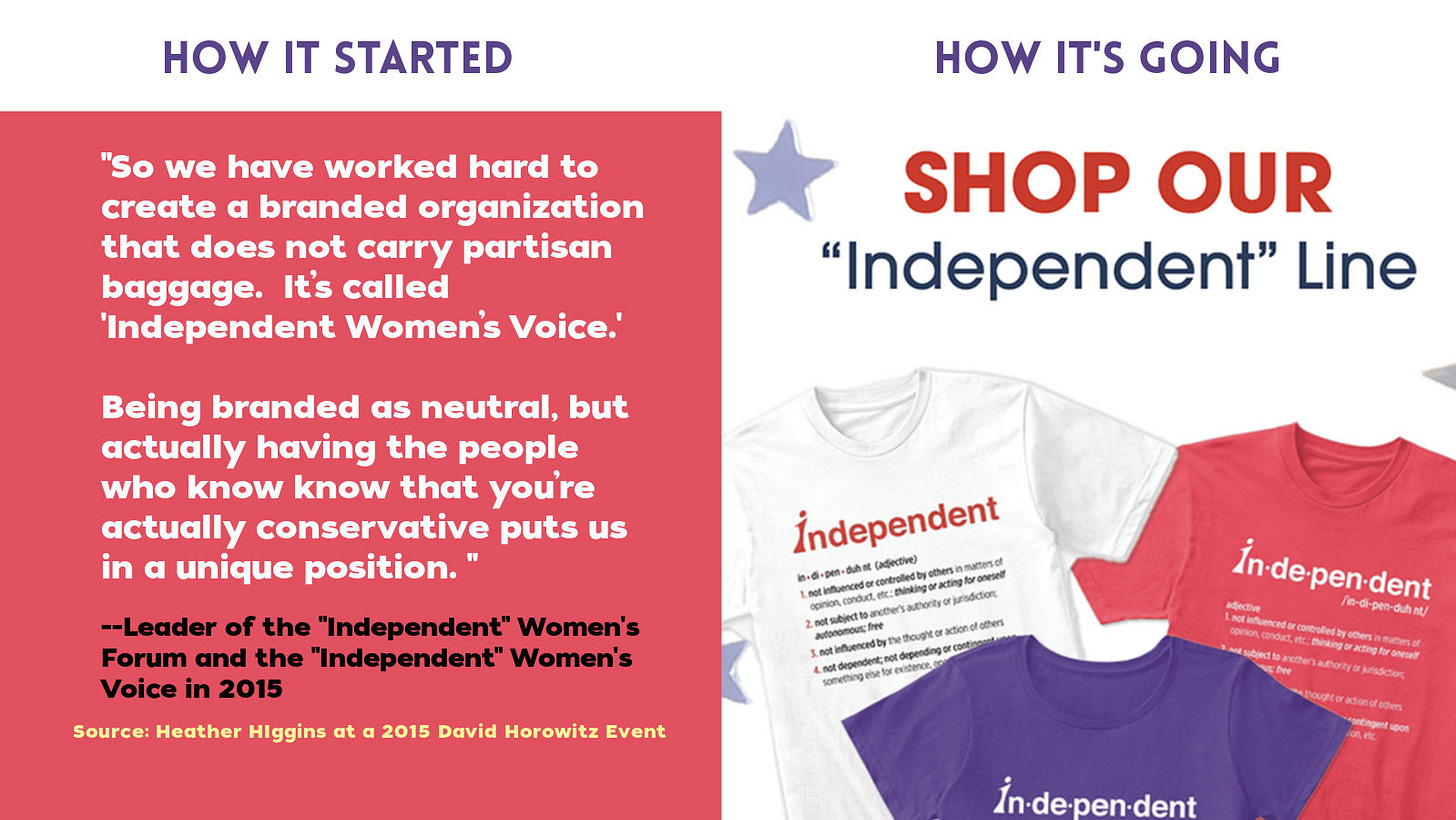How Many Bad Ideas Can One Guy Have? Charles Koch and the Roots of the Student Debt Crisis
Plus Who Is Attacking "Woke" Corporations, Standing Up to ALEC, and More
Welcome back!
Since our last Substack missive, the Supreme Court has issued two rulings that actually do undermine our democracy, and they were decided along partisan lines in 6-3 votes.
As Ari Berman, the author of Give Us the Ballot noted: “5 of 6 conservative Supreme Court justices were appointed by GOP presidents who initially lost [the] popular vote & confirmed by senators representing minority of Americans. American democracy [is] completely broken…”
The Court’s illegitimate attack on the Voting Rights Act rightly received wide coverage. The other ruling, in favor of Charles Koch’s political arm—Americans for Prosperity Foundation (AFPF)—did not, although Kimberly Strawbridge Robinson covered it well in Bloomberg Law.
That decision in favor of Koch’s AFPF “marks reporting and disclosure requirements with a bull’s-eye,” in the words of dissenting Justice Sonia Sotomayor. That is, it signaled that the right-wing majority of the Court is willing to strike down disclosure rules that shed light on dark money in our elections. You can learn more details in my thread on Twitter here.
But there’s more news you can use in this week’s edition.
Today we are launching a series of stories about Charles Koch’s long-standing attacks on public funding for public universities and public schools; this includes new information on the roots of the student loan debt crisis. We also unmask a front group that is attacking corporations that dare to standup to the seditionist faction in American politics. We also share some insights from Diallo Brooks, a national civil rights leader we recently interviewed.
We hope you enjoy these selections from our recent research!
Billionaire Charles Koch and the Libertarian Roots of the Student Debt Crisis
Part 1: The Crisis, Libertarian Roots, and Reasons for Hope
Feature by Caroline Jones and Lisa Graves, True North Research and BOLD ReThink
The Crisis. Americans are weighted down with student loan debt that totals more than $1.7 trillion. For scale, this equates to the wealth of 1,700 billionaires. But it is not extreme wealth. It is extreme debt—debt that cannot be discharged in bankruptcy and so it can be a particularly enduring, hellish debt.
Until it is paid off or unless it is forgiven, it siphons money every month out of your pocket and local communities and into the accounts of distant banks. It can also be so very heavy, limiting the ability of former students to buy a new car, rent an apartment, purchase a home, or pursue work that is not lucrative but is life-changing for oneself and others, in the arts, education, public service, or other fields.
It wasn’t always this way in America. It was a choice, a public policy preference pushed by some very narrow-minded white men in America, starting about 60 years ago.
Although they probably could not foresee it, most of the current student loan debt (about two-thirds) is held by women. (Banks were not even barred from refusing women credit until Congress intervened in 1974.) And Black women carry almost 20% more student debt than white women, according to the American Association of University Women. The GI Bill, which helped millions of soldiers attend college and get home loans, also disproportionately left Black Americans behind in its first decades.
Still, public universities were much more affordable back then relative to now. Many students could afford to pay tuition by working at night and on weekends—if their parents could not pay for their college. That’s another way that the discriminatory implementation of the GI Bill, combined with racist red-lining in real estate, has fueled generational disparities for Black Americans and other minorities.
Still, the relatively low cost of public universities meant that educational and economic opportunities were within reach for many Americans. They could pursue their dreams and a college education without debt, even if they had to work their way through school.
But something changed. It wasn’t just rising costs—it was reduced public investment in public universities.
It did not have to be this way, and it doesn’t have to be this way going forward.
So how did America get into this mess of debt?
Below, as the first part of a new series, we will document the early foundations of libertarian efforts to undermine public higher education, which led to ballooning student debt.
The Roots. The untold origin story is another example of the societal consequences of merging extreme Libertarian theories with extreme wealth and, with that, creating a disproportionate, distorting, and very negative influence on public policy in America.
It reflects a dystopian perversion of the “Golden Rule” that many kids were taught as a model for behavior. Instead, it’s a counter-democratic idea that the guy with the gold rules, or should rule.
One of those guys is Charles Koch, who is now one of the richest men on the planet. He controls one of the biggest privately held companies in the history of the world. Koch never attended public schools or a public university; after private prep schools, he attended MIT.
Koch has used his vast wealth to build a political empire that fertilizes a reactionary worldview he has embraced for nearly 60 years, or more. That view is one of deep hostility to the idea of public universities—for the public and largely funded by the public—and public infrastructure generally. The special interest groups Koch staked pushed for student debt as the way to fund college education and argued that public subsidy of public universities constituted unfair competition with the private sector.
Koch and his lieutenant, George Pearson, even peddled a kind of feudalistic idea that workers should attend corporate colleges of companies that would later employ them rather than have the wealthy subsidize the education of other company’s workers. (More on that in this multi-part series.)
Meanwhile, Koch and his allies have long pushed to limit the ability of state and federal governments to raise funds for public goods, like public universities.
In recent decades, Koch has exploited the shortfalls in public funding of colleges by using his wealth to dictate programs at universities to advance his agenda. His league of lawyers and some of the professors and administrators—who are loyal to the patron of their power—work within the universities to keep key details secret. To this day, as illustrated later in this series, non-profit groups that Koch has created or that his operatives control remain actively hostile to public funding of public universities and public schools for all.
Koch’s known opposition to public subsidies for education emerged in the 1960s around the same time as the passage of the 1965 Higher Education Act. That law increased federal money given to post-secondary institutions, including providing low-interest loans to students, so some would not have to work while attending college.
What else was happening back then? The Civil Rights movement was building on Supreme Court rulings that barred racial segregation and discrimination in colleges as well as primary and secondary schools. Some federal courts were trying to secure the mandate of Brown v. Education, while a right-wing and white racist faction in America fought against equality of opportunity for others every step of the way.
That faction included far right-wing fringe groups like the John Birch Society (JBS), which Charles Koch’s dad helped found. Charles Koch himself helped fundraise for JBS even as the group attacked Rev. Martin Luther King, Jr., and Rosa Parks. In this period, universities also became hotbeds of dissent and activism against injustice.
To be fair, Koch did not originate the attack on public funding of public universities. Perhaps the most significant articulation of the attack came from Milton Friedman in his book Capitalism and Freedom in 1962.
Koch and his confederates viewed any form of government subsidy as state control. They embraced instead “Pay As You Earn” (PAYE) structures and also systems where graduates would be indebted to corporations providing their education. The PAYE construct was premised on the theory that it is fairer for a student to pay debt for literally decades after college to fund tuition than for the government to tax private wealth in order to fund affordable university education for all.
Koch’s objection to public funding and government influence over the content of education is strikingly hypocritical in some ways. This is especially so in the face of Koch’s use of his wealth to secure posts for his acolytes at public universities, as well as how his political operation has tried to take over local school boards and change how history is taught, as we have seen with some of the people elected to school in Colorado who won due to “outside” spending by Koch’s Americans for Prosperity.
Meanwhile, Koch spending to influence university programs across the country has grown rapidly in the past two decades and is accelerating, as UnKoch My Campus recently documented. The Koch family fortune provided more than $112 million to universities in 2019 alone, and has provided nearly one half of a billion dollars since 2005.
Koch foundation gifts have often been tied to demands that universities cede to Koch operatives substantial control over professor selection, textbook selection, and even the required courses for specific degree programs.
In the view of Jasmine Banks, the Executive Director of UnKoch:
“A school that accepts funding from the Charles Koch Foundation is making a commitment to endorse & enable the Koch network’s harmful political agenda to halt action on climate change, deny millions of people healthcare,” and more.
[Graves, a co-author of this article, has served as an informal advisor to UnKoch My Campus.]
Over the next few weeks, we’ll be chronicling the largely unknown history of the role played by Charles Koch and right-wing spending in fueling the student debt crisis, sharing original documents that shed new light on how one very rich man helped plant the seeds for the disaster in student debt we see today.
But, all is not lost.
Reasons for Hope. For the first time in decades, America has a president who has repeatedly expressed concerns about this crisis, where on average a college student graduating in the class of 2021 has a student loan debt of $36,900. (That’s a whopping 76% over the average student debt for the class of 2000 and it outpaced the rate of inflation by 41%.)
In his first address to a joint session of Congress, President Joe Biden promoted his “American Families Plan.” That plan would guarantee all Americans access to at least two years of free community college education, in addition to other proposal to increase support for education to help American kids and adults to thrive.
If adopted, these measures would limit the amount of debt Americans would otherwise have to take on to pursue more education and training after high school.
The Biden administration has also forgiven a billion dollars in loans taken by students who were defrauded by for-profit colleges, and it is considering forgiving $10,000 or more per person in student loan debt.
These are good first steps, though they are not sufficient to turn the tide.
We are launching this series in the hope that through understanding how this crisis is rooted in a minority view of extreme hostility to public funding of universities, Americans can work together to help secure better public policies for their lives and for our shared future, for a more prosperous America with more opportunity for all.
Want to Do Something about This? If you’d like to do something about the student debt crisis, today, you can sign a petition right now to President Biden. It was written by the brilliant advocates and organizers at Color of Change, here.
(Several wonderful people have contributed ideas and research to the subject of this report, including Evan Vorpahl, R.J. Eskow, Lindsey Berger, Alyssa Bowen, and others. It began with a trip to a public university library Lisa took when she was the executive director of the Center for Media and Democracy, and it includes some documents preserved by the KochDocs project team and more. The great books and analysis of Nancy MacLean, Jane Mayer, and Chris Leonard about Koch have influenced this new research series, but any errors are our own.)
Boldly ReThinking
A Conversation with Diallo Brooks, Senior Director of Outreach and Partner Engagement for People for the American Way
True North Research co-leads a new project called the BOLD ReThink and has launched a series of Dialogues for Democracy about how to rethink public policy to boldly advance the public good and unmask the opponents of progress.
The second conversation in these dialogues is between True North’s Lisa Graves and Diallo Brooks, a leader in the fight for social justice and civil rights. Diallo began investigating the American Legislative Exchange Council (ALEC) almost twenty years ago. ALEC has played a key role in amplifying claims of voter fraud to state legislators, as detailed in a new timeline from the watchdog group Documented.
Here is a brief excerpt of that dialogue:
LG: Diallo, what should people know about the groups that are trying to limit our access to our democracy?
DB: I think it's really important that folks understand that a lot of what we see around the attacks around democracy don't come out of nowhere.
It’s not an individual legislator here or a person there that's just introducing some legislation. There are actually organizations and groups that are really cultivating these ideas and pushing them out amongst the network of elected officials that are really undermining our democracy. And a lot of those groups also have deep corporate connections, some of the policies that they're pushing around issues that not only undermine voting rights but actually help those companies profit…
[I]f you look at the corporate angle it's an opportunity to get with legislators who … don't have a lot of staff, they don't have a lot of support and so they're really taking advantage of that and kind of spoon feeding them policies that help their corporate bottom line…. Legislators are not leading the conversations, the corporations are leading the conversations around strategy and how to move these particular pieces of legislation forward in order to help their bottom line. And what it, what really happening and why folks need to be concerned and we've been concerned, Lisa….
[W]e understand that the corporate money that is going into the political space drowns out the voices of everyday folks. And so, we're working hard to push that forward. Also, we have a group of ministers in Georgia that have done a boycott on Home Depot, because as many as some of the corporations were actually coming to the table, they at least have conversations and speak out against the voter suppression legislation that we saw pass in Georgia.
Home Depot refused to even be a part of the conversation, even when folks like Coca-Cola invited them into a corporate group to speak with faith leaders about that. And so, what those ministers had taken up and one of the ministers, as a part of the group is our chair of our board. Reverend Tim McDonald is actually pushing this boycott forward against Home Depot, not just because of Home Depot, but to shed light on the importance of us pushing back against this voter suppression bills that are proliferating all over the Country and because of that boycott. You see what happened in Texas with corporations coming out against the voter suppression bills that were happening in Texas….
Watch here to learn more and also be moved when Diallo talks about how his mom is his greatest hero! You can also follow us on Facebook to get inspired and join the dialogues.
Check out our unmasking of one of the groups attacking corporations for daring to object to attacks on our democracy, below.
A New Anti-”Woke” Advertiser Is a Dark Money Group Made from an Old Brand and Fueled by Secret Cash
A Backgrounder by Lisa Graves and Evan Vorpahl
A group called "Consumers' Research" recently grabbed headlines after announcing a million dollar ad buy against "woke" corporations that have taken a stand against rightwing measures to make it harder for Americans to vote.
CNBC called it a "dark money" group after it refused to disclose who is bankrolling those ads attacking Coca Cola, American Airlines, and Nike.
The ads seem designed to try to chill the named CEOs -- and others -- from bucking the GOP's false claims about voter fraud in the 2020 election, which Democrats have dubbed "the Big Lie" that Donald Trump supposedly won the election. According to the election certifications of state officials, Trump lost big, by more than 7 million in popular votes and by 74 Electoral College votes. And Trump's outright lies about the election -- which had the highest percentage of voter participation in 60 years -- incited a violent insurrection at the Capitol on January 6.
So Who Is Consumers’ Research? Here are three key facts to know:
1. Consumers' Research was “established” in 1929, but it basically died in 2002 -- with zero or almost no income for a decade -- only to be reborn in 2013 as a vehicle for amicus briefs tied to GOP Attorneys General. It did not even have a website until a few years ago (2013), but it does have big secret money. So, it is legally true that a group with its name got its start 90+ years ago; and it is also true that it barely existed in this century, until recently.
2. Consumers' Research has taken positions at odds with … most consumers; it:
opposed life-saving airbags in cars, fuel efficiency standards, climate change science, rules against junk mail faxes, and even limits on cancer-causing products;
sided with payday lenders against limits on interest rates;
attacked the Affordable Care Act and the Consumer Financial Protection Bureau;
And sided with Big Tobacco companies against second-hand smoke regulations.
No wonder it has hardly any followers. As “@ConsumersFirst” on Twitter it has 3,697 followers -- that’s fewer than me (Lisa) and I wasn’t established in 1929 -- and even fewer on Facebook.
3. Consumers' Research has had just one known human funder in the past decade: a super rich Chicagoan, Barre Seid, whose identity was kept secret from the public until now. Seid is also believed to be the secret multi-million dollar funder of George Mason University’s Antonin Scalia School of Law, along with (guess who?) Charles Koch. He has been involved in right-wing politics for decades, as detailed in our full report.
Want to know more about Consumers’ Research? We’ve got the receipts here.
Get Smarter Faster: Common Cause, Fair Fight, BOLD ReThink, True North Research, the Center for Media and Democracy, and Hundreds of Others Demand Corporations Dump ALEC over Its Role Pushing Lies about Voting
More than 300 civil society organizations signed a letter calling on corporations to pull funding from the American Legislative Exchange Council over its role in buttressing Donald Trump’s election lies and spreading new discriminatory, anti-democratic voting bills across the country.
As the letter noted:
“ALEC has used its power to draft and advance Jim Crow-style voter suppression legislation throughout the country. They have partnered with extreme, dark money groups like the Heritage Foundation to try to implement the most suppressive and dangerous pieces of voting legislation that our country has ever seen…”
Common Cause, Fair Fight, and hundreds of other groups joined the letter, including True North Research and the BOLD ReThink.
ALEC is a corporate bill mill where corporate lobbyists vote as equals with legislators behind closed doors on “model” legislation to change the rights of Americans. ALEC has a long history of making it harder for Americans to vote. More recently ALEC created a secret working group on elections, which has featured Cleta Mitchell, Hans Von Spakovsky, Jason Snead, and others promoting debunked claims of voter fraud.
You can read the full letter here.
The Shot
For Independence Day, the right-wing Independent Women’s Forum (IWF) held a flash sale for t-shirts with the definition of the word “independent” on the front, which inspired us to create this meme based on a prior boast from IWF and its IW Voice:
The Chaser
Here is one of the many inspiring songs by musical genius and civil rights activist Nina Simone: “Feelin’ Good.”









